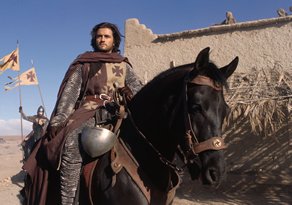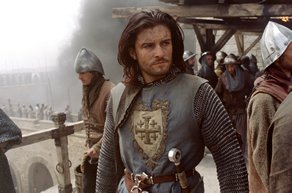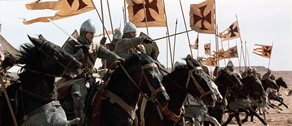Genre: War/Action/Drama
Director: Ridley Scott
Starring: Orlando Bloom, Eva Green, Jeremy
Irons, David Thewlis, Brandan Gleeson, Edward Norton, Liam Neeson
RunTime: 2 hrs 23 mins
Released By: 20th Century Fox
Rating: NC-16 (War Violence)
Release
Date: 5 May 2005
Synopsis
:
From
the Director of Gladiator, Ridley Scott, comes an epic romantic
action/adventure set in 12th Century Europe and the exotic
East during the Crusades. Orlando Bloom stars as a young peasant
who becomes a renowned knight, saves a kingdom, and in the
midst of it all falls in love with a princess. Co-starring
are Liam Neeson, Eva Green, Jeremy Irons and Edward Norton.
Movie
Review:
Hollywood filmmakers have long been blamed for causing confusion
to our children (and even adults) with their movies that hard
sell as “historic” or “epic” production.
Though the movie poster bears no statement like “Based
on true historical events”, it is still undeniable that
the incorrect facts delivered by these movies, would be adamant
on the mind of our children and adults alike. In spite of
the negative effects and criticism, such “twister”
continue to spring off; “Kingdom of Heaven” the
latest epic movie by Ridley Scott, the man behind the successful
“Gladiator”, is unfortunately one such movie.
Set
in the 12th century, the story tells the life of Balian (Orlando
Bloom), a blacksmith who long-lost father, Godfrey of Ibelin
(Liam Neeson) invited him to Jerusalem, coincidentally on
the day of his wife’s burial. Believing that Jerusalem
is the place where he could atone for the sins of his late
wife, who had committed suicide over the lost of their son
(by the Catholic doctrine, those committed suicide would be
banished to hell), Balian agrees to follow his father. Unfortunately
for Balian, Godfrey does not hang around with him for long
either. After sharing a short moment of sword training, Godfrey
sustained a deadly wound along the way to Jerusalem. Before
his final hour, Godfrey knight Belian and confers upon him
the title “Baron of Ibelin”. Balian continues
the journey and finally arrives in Jerusalem and became the
ally of the leper king, Baldwin IV (Edward Norton), and the
Marshall of Jerusalem, Tiberias (Jeremy Irons). The opposite
fraction of King Baldwin IV led by Guy de Lusignan (Marton
Csokas), one of the most influential man in Jerusalem, instantly
disgusted by Balian’s presence, citing his peasant background
misfit to be a knight. But that does not deters Balian from
having an affair with his wife, Sibylla, the Princess of Jerusalem
(Eva Green) while the unsuspecting Guy plots to overthrown
Baldwin IV by disrupting the peace in Jerusalem with his sabotage
on Muslim civilians belonging to the powerful Arab leader
Saladin (Ghassan Massoud). When Saladin mobilised his army
of 200,000 men, threatening to take back Jerusalem from the
Christians, the ex-blacksmith shown his excellently crafted
swordplay and war tactics, defending the people within the
city walls.
If
you have look into the historian’s findings about Jerusalem,
you may want to thank Screenwriter, William Monahan for simplifying
things for the audience to digest. However, the kind intention
had even distorted the background of the historical figures,
turning some heroes to zeros and vice versa.
Balian’s father, Godfrey of Ibelin, was invented. The
fact is Balian was the son of Barisan of Ibelin, had two elder
brothers and was blissfully married with a son. His wife did
not committed suicide for a lost son as what was stated in
the movie.
The
relation between Balian and Sibylla was fictional. Sibylla
was happily married to Guy de Lusignan. In the movie, the
affairs between Balian and Sibylla had started off to be the
focal point, however, retreated into redundancy as the plots
developed, leaving you wondering what is the intention of
the scriptwriter for unjustly alleging that both were sexually
linked.
In
the political aspect, the succession to Baldwin IV’s
throne was not directly handed to Sibylla as what portrayed
in the movie. It was in fact first handed down to Sibylla’s
son, Baldwin V, who died after briefly ruled Jerusalem for
a few months. Guy de Lusignan took over the throne and Balian
reluctantly served him. It was unsure whether the feud between
Guy de Lusignan and Balian in the movie truly existed in that
fashion, but the gradual evaporation of this vengeance left
many audiences unsatisfied. It could have been a challenging
conclusion between the two men, one holding absolute power
while the other endeared by the people, but this anticipation
failed to realize it's fullest potential.
In
one scene, Balian advised Guy not to move his army out of
the city wall as that is what Saladin wanted them to do. However,
the proud Guy disregards Balian warning and proceed to meet
Saladin’s army in this well-known historical battle,
the Battle of Hattin while Balian stay put in the city, preparing
for the final confrontation together with the people. Again,
Historians have different interpretation on this part - It
is Balian’s brother, who had advised Guy not to move
the army out of the city and Balian actually follow Guy to
the battle but fortunately escape the defeat while Guy was
held captive.
In
the movie, Guy’s fate, though seem to be one of the
anchor point, was left unexplained after the Battle of Hattin.
On the other hand, Balian catapulted to become well respected
and love by his comrades even though he does not have much
military might or having gone through any “thick and
thin” with them, was rather illogical. In addition,
how Balian became so well crafted with sword and war tactics
after receiving a few minutes of lesson from his father, Godfrey
was again rationally questioned.
The
concluding battle in the movie shows Balian defending Jerusalem
against the army of Saladin. However, the history book had
stated that it was Sibylla who commanded the defense although
Balian indeed negotiated the subsequent surrender of Jerusalem
to Saladin. The scriptwriter had turned Sibylla into a humble
woman-in-love whereas in actual fact she plays an important
role in Jerusalem’s history and was well known for her
craftiness and political intelligence.
The
long list of flaws and historical discrepancy fortunately
does not hinder audience senses in enjoying the movie. While
it is disappointing that none of the casts particularly excel
in their performance: the talented Edward Norton hidden behind
an iron masks for his role as leper Baldwin IV, Liam Neeson
“game over” too soon, boyish-face Orlando Bloom
unconvincing in such macho role; it was Ridley Scott’s
mastery in handling the sets that again marvel audiences.
You are spared from the overly used clashes between sea of
soldiers like those of “Lord of the Rings” or
“Troy”. The battle scenes were being handled to
the finest details with bird eye and wide-angle views presenting
you with the formation and movement of the troops in encountering
the opponent’s attack. The locations of filming were
also well chosen, giving you many eye- pleasing and unforgettable
sceneries.
Kingdom
of Heaven may not delivers correct historical facts nor does
it gives you a better idea of the religious conflicts over
Jerusalem, which continue to exist till today. However, where
most epic movies had failed, Scott done a great job keeping
the action sequences tight but not forgetting to deliver the
message of respect and tolerance towards oneself and others.
Balian’s vows to protect the people and not the stones
of the city, hopefully could serve as a timely reminder to
some of today’s “hungry” Country leading
man, who seem to be more interested in gaining personal benefits
at the expense of the people’s lives.
Movie
Rating: B
Review by Leosen
|






